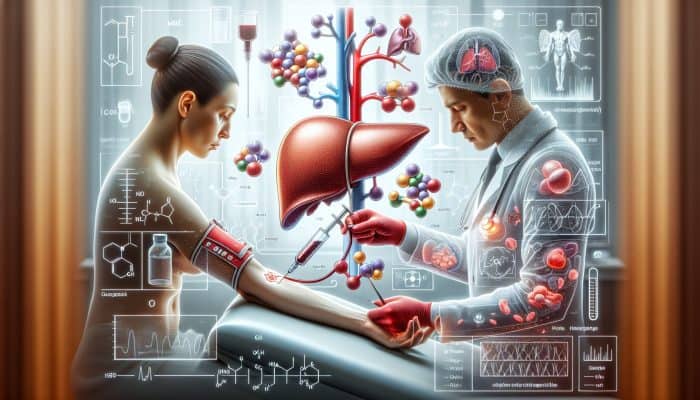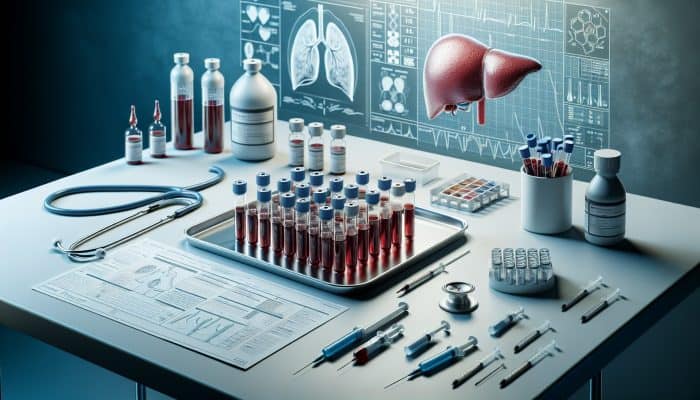Comprehensive Guide to Mastering Liver Blood Tests for Optimal Health
Exploring the Essential Role of Liver Blood Tests in Comprehensive Health Assessments

A liver blood test in Hinckley is an indispensable diagnostic evaluation that examines the functionality and well-being of the liver by assessing various biochemical markers found in the bloodstream. The liver is a vital organ in the human body, responsible for numerous critical functions, including metabolism, detoxification, and the production of essential proteins. This blood analysis provides healthcare professionals with invaluable information regarding the operational state of the liver, enabling them to identify potential health issues at an early stage. By examining particular enzymes and proteins, this test plays a crucial role in detecting liver inflammation, damage, or diseases, forming a foundational element for promoting overall health and wellness.
The liver blood test primarily evaluates the levels of key enzymes including alanine aminotransferase (ALT) and aspartate aminotransferase (AST), which are released into the bloodstream upon liver cell injury. Additionally, other significant markers such as alkaline phosphatase (ALP), bilirubin, and Albumin levels are also assessed. Each of these markers provides distinct insights into liver health; for example, elevated bilirubin levels may suggest a blockage in bile flow or liver impairment, while reduced albumin levels could indicate chronic liver disease. Understanding these markers is vital for effective health management.
For inhabitants of Hinckley, comprehending what a liver blood test in Hinckley entails is crucial. This examination is far more than just a routine assessment; it serves as a significant opportunity to monitor overall health and identify potential issues before they escalate into severe conditions. Healthcare professionals frequently recommend this test during routine health check-ups or when symptoms such as jaundice, fatigue, or abdominal pain are presented, effectively linking proactive health management to improved health outcomes.
Utilising Liver Tests to Uncover Potential Health Issues
Liver tests are vital for diagnosing a variety of liver disorders, including hepatitis, fatty liver disease, cirrhosis, and liver cancer. The prompt identification of these conditions enables timely interventions, which can significantly enhance patient outcomes. For instance, recognising hepatitis in its early stages can avert long-term liver damage, while detecting fatty liver disease can instigate necessary lifestyle changes before it progresses to more severe liver complications.
Regular liver function tests are equally important for monitoring ongoing liver diseases. If a patient has already been diagnosed with a liver condition, blood tests can evaluate the effectiveness of treatment and indicate whether the disease is advancing or improving. Furthermore, these tests assess the liver’s capacity to metabolise medications, which is particularly significant for individuals undergoing prolonged medication regimens.
In Hinckley, where access to healthcare services is essential, acknowledging the significance of these tests empowers individuals to take charge of their health. Proactively discussing liver function tests with healthcare providers can be a pivotal step in preventing serious health issues, making awareness of the liver blood test in Hinckley crucial for the well-being of the local community.
Exploring the Different Types of Liver Function Tests
A diverse array of liver function tests exists, and familiarising oneself with these can facilitate better interpretation of results. The most commonly conducted tests include ALT, AST, ALP, bilirubin, and Albumin levels, each shedding light on various aspects of liver health.
Alanine aminotransferase (ALT) is primarily located in the liver, and raised levels typically indicate liver damage. Conversely, aspartate aminotransferase (AST), while also a marker for liver health, is present in other tissues such as the heart and muscles, resulting in less specificity. Alkaline phosphatase (ALP) is another enzyme that can signal liver or bile duct issues when elevated.
Bilirubin levels reflect the liver's ability to process waste products; elevated bilirubin can lead to jaundice, which is characterised by the yellowing of skin and eyes. Albumin, a protein produced by the liver, is crucial for maintaining fluid balance within the bloodstream; low levels may indicate chronic liver disease or dysfunction.
For residents of Hinckley, awareness of these markers is critical, as they provide vital insights into liver health. A comprehensive understanding of the liver blood test in Hinckley can empower individuals to engage in informed discussions with their healthcare providers, ensuring they receive tailored care that addresses their unique health requirements and concerns.
Key Steps to Prepare for Your Liver Blood Test

Essential Guidelines to Follow Before Your Liver Blood Test
Preparing for a liver blood test in Hinckley requires adherence to certain straightforward yet crucial guidelines to guarantee the accuracy of your results. Primarily, fasting for several hours before the test may be necessary. Your healthcare provider will typically provide specific instructions regarding when to cease eating and drinking. This preparation is vital, as certain foods and beverages can alter liver enzyme levels and potentially jeopardise the accuracy of the test results.
In addition to dietary restrictions, it is crucial to inform your doctor about any medications, supplements, or herbal remedies you are currently using. Some substances can influence the outcomes of liver function tests and may need to be temporarily discontinued prior to testing. Furthermore, being transparent about your health history—including any chronic illnesses or past liver-related issues—enables your healthcare provider to interpret your results more accurately and effectively.
Timing is another essential factor; morning appointments are often recommended as they allow for an extended fasting period. Additionally, maintaining a calm and relaxed state before the test can aid in managing anxiety, as stress could influence physiological responses. Taking the time to prepare thoroughly can lead to a smoother experience and yield more reliable results, ultimately benefiting your health assessment.
What to Expect During Your Liver Blood Test Procedure
The process of undergoing a liver blood test in Hinckley is relatively uncomplicated and typically lasts only a few minutes. A qualified healthcare professional will draw blood, usually from a vein in your arm. Prior to the draw, the area will be cleansed with an antiseptic solution to minimise the risk of infection. The application of a tourniquet may assist in making the veins more prominent, facilitating the insertion of the needle.
While some individuals might experience mild discomfort or a quick prick when the needle is inserted, the entire procedure is generally quick and efficient. The collected blood sample is then dispatched to a laboratory for analysis. It is important to remember that blood tests are routine procedures, and healthcare professionals are well-trained to ensure minimal discomfort for patients during the process.
Once the blood is drawn, there is typically no need for significant downtime. Patients can generally resume their normal activities immediately after. However, if someone feels lightheaded or dizzy following the procedure, it is advisable to sit down for a few moments to recover. Understanding the simplicity of the process can help alleviate any apprehension regarding the liver blood test in Hinckley, ensuring a more positive experience.
Post-Test Guidelines and Anticipating Next Steps

After completing a liver blood test in Hinckley, patients can usually return to their regular activities without delay. Typically, there are no restrictions on diet or exercise unless otherwise advised by the healthcare provider. However, some individuals may experience minor bruising at the site of the blood draw, which is a common occurrence and usually resolves on its own within a few days.
Results from liver blood tests generally become available within a few days, although the precise timeframe may vary based on the laboratory’s processing speed. Healthcare providers will discuss the results with patients, offering insights into what the numbers signify regarding their overall health and any necessary follow-up actions.
It is beneficial for patients to take the initiative to schedule a follow-up appointment to review their results, particularly if any markers fall outside the normal ranges. Understanding these results can be crucial for making informed decisions about lifestyle adjustments or further medical evaluations. In Hinckley, the availability of follow-up care ensures that individuals can access comprehensive support throughout the testing process, fostering a better understanding of their liver health and the implications of test results.
Finding a Liver Blood Test Facility in Hinckley
Hinckley and District Hospital: Your Primary Testing Location
For residents in need of a liver blood test in Hinckley, Hinckley and District Hospital serves as a principal facility offering extensive blood testing services. Conveniently situated on Mount Road, this well-equipped hospital provides a variety of diagnostic services, including thorough liver function tests.
Patients can benefit from the hospital’s advanced laboratory facilities, ensuring accurate and timely results. The healthcare professionals at the hospital are well-prepared to guide patients through the testing process, addressing any questions or concerns they may have before and after the test. The hospital’s dedication to patient care guarantees that individuals feel comfortable and supported throughout their healthcare experience.
Moreover, Hinckley and District Hospital fosters a collaborative environment where various healthcare specialists work together to deliver holistic care. If test results indicate the necessity for further investigation or treatment, patients have access to a network of specialists, streamlining the process and promoting continuity of care. This interconnected approach is essential for managing liver health, as timely referrals and collaborative treatment strategies can significantly enhance patient outcomes.
Private Clinics for Fast Liver Blood Tests in Hinckley
In addition to the hospital, several private clinics in Hinckley offer liver blood tests in Hinckley with quick turnaround times. These facilities often provide the advantage of shorter waiting periods and flexible appointment scheduling, making them an excellent choice for individuals with busy lifestyles.
Many private clinics also employ dedicated healthcare professionals who specialise in diagnostic testing, ensuring a high level of expertise and personalised care. The streamlined processes at these clinics typically involve minimal paperwork, allowing patients to concentrate on their health rather than administrative tasks.
Additionally, the privacy and tailored care offered by private clinics can provide an added layer of comfort for those seeking testing. Patients can receive their results in a confidential setting, with healthcare providers available to discuss any concerns or next steps. Opting for a private clinic for a liver blood test in Hinckley can be an excellent option for those prioritising convenience, speed, and a personalised healthcare experience, facilitating better management of liver health.
Local GP Services for Accessible Liver Blood Tests
Your local GP in Hinckley plays a pivotal role in facilitating access to liver blood tests in Hinckley. If you are experiencing symptoms related to liver health or wish to undergo testing as part of a routine health check-up, consulting your GP is an excellent first step.
GPs can evaluate your medical history, discuss any symptoms you may be experiencing, and determine if a liver blood test is appropriate for your situation. They will provide referrals for the test, ensuring that you receive the right care tailored to your specific needs and circumstances.
After the test, your GP will be instrumental in interpreting the results. Given their familiarity with your health history, they can offer context and recommendations based on the findings. If necessary, your GP can refer you to a specialist for further evaluation or treatment, ensuring a comprehensive approach to managing your liver health and overall well-being.
By engaging with your GP for a liver blood test in Hinckley, you are taking a proactive stance towards your health. The continuity of care provided by your GP fosters a supportive environment where patients can feel empowered to seek assistance and guidance throughout their healthcare journey, thus enhancing their overall health management.
Decoding and Understanding Liver Blood Test Results
Recognising Normal Ranges for Liver Function Tests
Understanding the normal ranges for liver function tests is essential for accurately interpreting test results. Generally, each test measure corresponds to specific ranges, which may vary depending on the laboratory conducting the analysis. For example, normal ALT levels typically range between 7 and 56 units per litre (U/L), while AST levels should be between 10 and 40 U/L. Alkaline phosphatase levels are generally considered normal at 44 to 147 U/L, and bilirubin levels should be less than 1.2 milligrams per decilitre (mg/dL).
For individuals in Hinckley, being familiar with these ranges can aid in recognising when follow-up actions may be necessary. Understanding your liver blood test results empowers you to actively engage in discussions with your healthcare providers, fostering a collaborative approach to health management. If your levels fall within the normal range, it usually indicates that your liver is functioning optimally, thereby reducing the risk of severe liver conditions and complications.
However, it is crucial to keep in mind that normal ranges can differ based on various factors such as age, sex, and even ethnicity. Therefore, discussing your specific results with a healthcare provider who is knowledgeable about your personal health history is essential for accurate interpretation and understanding of your liver health status.
Understanding the Significance of Abnormal Test Results
When liver blood test results reveal elevated or decreased enzyme levels, it can raise concerns about potential liver disease or other health complications. For instance, increased ALT or AST levels may suggest liver inflammation or damage, while a significant rise in alkaline phosphatase could indicate cholestasis or bile duct obstruction.
For residents of Hinckley, grasping these implications can facilitate timely interventions. If your results display abnormal levels, it is imperative to consult your healthcare provider for further evaluation. They may suggest additional tests, imaging studies, or lifestyle modifications to address any underlying issues that may be impacting your liver health.
In certain instances, persistent abnormal results may necessitate a referral to a specialist, such as a hepatologist, for a more comprehensive evaluation and management plan. Engaging in open discussions with your healthcare team allows you to explore potential causes and treatment options, ensuring you are well-informed about your liver health and the appropriate steps to take.
Determining Appropriate Follow-Up Actions Based on Test Results
The follow-up actions taken after receiving liver blood test results can vary significantly depending on the findings. If results indicate normal liver function, your healthcare provider may recommend routine monitoring as part of your regular health check-ups, ensuring that your liver health remains stable over time.
Conversely, if results show abnormal enzyme levels, your provider may recommend further diagnostic testing to identify the underlying cause, which could include imaging studies like an ultrasound or CT scan. Additionally, lifestyle modifications may be advised, such as dietary adjustments, weight management, or a reduction in alcohol consumption, all of which can contribute to enhancing liver health and functionality.
If a specific liver condition is diagnosed, a tailored treatment plan will be developed to manage the issue effectively. For individuals in Hinckley, access to local healthcare resources ensures that appropriate follow-up care is readily available, allowing for ongoing support and management of any liver-related conditions.
Taking proactive measures based on your liver blood test in Hinckley results is crucial for maintaining liver health. Engaging in regular check-ups, implementing lifestyle changes, and adhering to your healthcare provider’s recommendations can significantly improve your overall well-being and mitigate the risk of severe liver disease and complications.
Common Liver Conditions Detected Through Blood Testing
Identifying Hepatitis Through Comprehensive Blood Testing
Hepatitis represents a significant liver condition that can be detected through blood tests, including the liver blood test in Hinckley. This viral infection can lead to liver inflammation and, if left untreated, may result in severe complications such as liver cirrhosis or even liver cancer. Blood tests are vital for identifying types B and C of hepatitis, which are particularly concerning due to their potential for chronic infection and long-term health implications.
Symptoms of hepatitis can vary widely, ranging from mild to severe, and may encompass fatigue, jaundice, abdominal discomfort, and loss of appetite. Regular screening is essential, especially for individuals at heightened risk, such as those with a history of intravenous drug use or unprotected sexual contact. Being vigilant about hepatitis testing can empower individuals to take proactive steps towards their liver health.
In Hinckley, healthcare providers can facilitate hepatitis testing as part of routine blood work or when symptoms arise. Early detection through a liver blood test in Hinckley is crucial; it can enhance treatment success rates and reduce the likelihood of enduring liver damage, ultimately promoting long-term health and well-being.
Understanding Fatty Liver Disease Through Liver Blood Tests
Fatty liver disease is becoming increasingly common, particularly in light of rising obesity rates. Characterised by the accumulation of fat in the liver, this condition can be effectively monitored through blood tests. Elevated liver enzymes, particularly ALT and AST, may indicate the presence of fatty liver disease, which is often associated with lifestyle factors such as poor diet and insufficient physical activity.
Residents in Hinckley should be aware of the risk factors linked to fatty liver disease, as early intervention can prevent progression to more severe liver conditions. A comprehensive liver blood test in Hinckley can facilitate early detection, allowing for critical lifestyle modifications, including improved dietary choices and increased physical activity to support liver health and functionality.
Moreover, healthcare providers can guide patients through personalised treatment plans, which may involve nutritional counselling and support for weight loss. The local resources available in Hinckley ensure that individuals can access the comprehensive care necessary to manage and mitigate the risks associated with fatty liver disease, promoting a healthier future.
Identifying Cirrhosis Through Blood Testing
Cirrhosis is an advanced stage of liver disease that can be monitored through regular blood tests. This condition arises from long-term liver damage and may be attributed to chronic hepatitis, alcohol abuse, or fatty liver disease. Early identification of cirrhosis is critical, as it can lead to severe complications, including liver failure and liver cancer.
Blood tests are indispensable for monitoring liver function in patients diagnosed with cirrhosis. Elevated liver enzymes and abnormal bilirubin levels can signify declining liver function, prompting healthcare providers to take necessary action to address these issues effectively.
For residents of Hinckley, understanding the implications of a liver blood test in Hinckley can empower individuals to seek ongoing care for chronic liver conditions. Regular monitoring and proactive management strategies can significantly enhance quality of life and reduce the risk of complications associated with cirrhosis, ultimately supporting better health outcomes.
How Lifestyle Choices Influence Liver Health
The Role of Diet and Nutrition in Supporting Liver Function
A nutritious diet is fundamental in promoting liver health. Nutritional choices can significantly impact liver functionality and help reduce the risk of developing liver disease. Diets low in saturated fats, sugars, and refined carbohydrates are advisable for maintaining optimal liver performance and overall well-being.
Incorporating whole foods such as fruits, vegetables, whole grains, lean proteins, and healthy fats can provide essential nutrients that enhance liver health. Antioxidant-rich foods, including berries, leafy greens, and nuts, help protect the liver from oxidative stress, while protein is critical for the production of albumin and other vital substances necessary for overall health.
Recognising the connection between diet and liver health can motivate residents of Hinckley to make informed choices that improve their overall well-being. Engaging with local nutritionists or dietitians can further deepen one's understanding of how specific foods impact liver health, providing personalised guidance tailored to individual needs and health objectives.
Incorporating dietary changes may also be crucial for managing liver conditions identified through a liver blood test in Hinckley. By promoting a diet conducive to liver healing, individuals can take ownership of their health and effectively support their liver function, thereby reducing the risk of further complications.
Evaluating Alcohol Consumption for Protecting Liver Health
Minimising or eliminating alcohol consumption is vital for preventing liver damage and promoting optimal liver health. Alcohol-related liver disease remains a significant concern, especially for individuals with a history of excessive alcohol consumption. Chronic alcohol intake can result in fatty liver, hepatitis, and cirrhosis, making it essential for individuals to evaluate their drinking habits and make necessary adjustments.
For residents of Hinckley, understanding the impact of alcohol on liver health can inform decision-making regarding alcohol consumption. Engaging with local support groups or counselling services provides essential resources for individuals seeking to reduce their alcohol intake or quit altogether, nurturing a healthier lifestyle.
The positive effects of reducing alcohol consumption on liver health can be profound. Improved liver function, enhanced overall well-being, and a decreased risk of liver disease are significant motivators for individuals looking to make lifestyle changes. A liver blood test in Hinckley can serve as a benchmark to track progress over time, reinforcing the benefits of adopting a healthier lifestyle and making informed choices regarding alcohol intake.
The Importance of Exercise and Weight Management
Maintaining a healthy weight and engaging in regular physical activity are vital components of promoting liver health. Obesity is a significant risk factor for fatty liver disease, which can escalate into more serious liver conditions if not addressed.
Incorporating regular exercise into daily routines can help manage weight and enhance liver function. Activities such as walking, jogging, cycling, and swimming improve cardiovascular health, lower fat levels in the liver, and enhance overall metabolic function, contributing positively to liver health.
Residents of Hinckley can take advantage of local fitness resources, including gyms, community centres, and walking groups, to support their efforts in maintaining a healthy lifestyle. Understanding the connection between exercise and liver health can motivate individuals to take action and prioritise their well-being, ultimately improving their quality of life.
Furthermore, individuals who have undergone a liver blood test in Hinckley may find that regular exercise and effective weight management can positively influence their test results, underscoring the significance of a healthy lifestyle in preventing and managing liver disease.
Prioritising Quality Sleep for Optimal Liver Function
Adequate and restorative sleep is often underestimated but plays a critical role in sustaining liver health. Sleep is essential for the body’s detoxification processes; insufficient sleep can impair liver function and contribute to conditions such as fatty liver disease and other metabolic disorders.
Residents of Hinckley should prioritise good sleep hygiene practices, such as maintaining a consistent sleep schedule, creating a restful environment, and avoiding stimulants before bedtime. Quality sleep supports liver regeneration and overall health, enhancing bodily functions and overall wellness.
Individuals who have experienced liver conditions identified through a liver blood test in Hinckley may notice improved health outcomes by focusing on sleep quality. Engaging in relaxation techniques, such as meditation or gentle yoga, can also aid in achieving better sleep and subsequently support liver health.
Recognising the connections between sleep and liver function empowers individuals to take charge of their health, ensuring they take the necessary steps to support their liver through adequate rest and recovery.
Managing Stress for Improved Liver Health
Chronic stress can have detrimental effects on liver functionality, often leading to inflammation and exacerbating existing health issues. Effectively managing stress is crucial for maintaining liver health and preventing disease progression.
For residents of Hinckley, exploring local resources for stress management can be beneficial. Techniques such as mindfulness, meditation, and physical activity can effectively reduce stress levels. Participating in group activities or seeking guidance from mental health professionals can also provide valuable coping strategies.
Understanding the impact of stress on liver health can encourage individuals to prioritise their mental well-being. For those undergoing liver blood tests in Hinckley, managing stress can contribute positively to their overall health outcomes, reinforcing the importance of a holistic approach to health management and well-being.
Incorporating effective stress management techniques into daily routines can foster a more balanced lifestyle, ultimately supporting liver health and enhancing overall quality of life for individuals in the community.
Accessing Support and Resources Available in Hinckley
Joining Local Support Groups for Enhanced Liver Health
Participating in a liver health support group in Hinckley can provide invaluable emotional and practical assistance for individuals confronting liver health challenges. These groups foster a sense of community, allowing members to share experiences, resources, and coping strategies that can help them navigate their health journeys more effectively.
Support groups create a safe space where individuals can openly discuss their conditions, connect with others who understand their struggles, and receive encouragement and motivation to pursue better health outcomes. For residents navigating a liver blood test in Hinckley, engaging with a local support group can reinforce their healthcare journey and provide essential emotional support.
Healthcare professionals in Hinckley may also recommend specific support groups tailored to liver health. These connections can provide access to valuable information, including lifestyle recommendations and emotional support, creating a collaborative environment for managing liver health effectively.
Utilising Educational Resources for Enhanced Knowledge
Accessing educational resources related to liver health can significantly empower individuals in Hinckley to take charge of their well-being. Various platforms offer information on liver conditions, prevention strategies, and tips for healthy living that can have a profound impact on one's health.
Local healthcare providers, libraries, and community centres may host workshops or distribute informative materials regarding liver health. Online resources, including reputable websites and forums, can also provide essential information about managing liver health and understanding test results, making knowledge more accessible.
When residents of Hinckley engage with these educational resources, they become better equipped to make informed decisions regarding their health. Utilising the knowledge gained from these platforms can enhance discussions with healthcare providers, ultimately leading to improved health outcomes and a proactive approach to health management.
Furthermore, staying informed about liver health can facilitate proactive measures, encouraging individuals to seek appropriate testing and interventions when necessary, thereby fostering a culture of health awareness in the community.
Leveraging Online Resources for Effective Liver Health Management
The digital age provides a wealth of online resources that can be invaluable for individuals seeking to manage their liver health from the comfort of their homes in Hinckley. Various websites and online forums offer access to information about liver diseases, treatment options, and lifestyle changes that can support liver function and overall health.
Online communities can foster connections with others who share similar experiences, providing a platform for sharing advice, tips, and emotional support. Engaging with these resources can be particularly beneficial for individuals who may feel isolated in their health journeys, helping them to feel more connected and supported.
In addition to forums, reputable health websites offer articles, videos, and webinars on liver health topics, ensuring that individuals have access to accurate and up-to-date information. Staying informed through these online resources can empower residents of Hinckley to take action regarding their liver health and make educated choices about their lifestyle and care.
Embracing the wealth of information available online further enhances the experience of individuals navigating a liver blood test in Hinckley, reinforcing the importance of education and community support in managing liver health effectively.
Frequently Asked Questions Regarding Liver Blood Tests
What does a liver blood test entail?
A liver blood test assesses various enzymes and proteins in the blood to evaluate liver function and detect potential liver diseases, ensuring a thorough evaluation of liver health.
Why is fasting required prior to the test?
Fasting ensures accurate results, as certain foods and beverages can significantly affect liver enzyme levels in the bloodstream, potentially skewing the test outcomes.
How long does the blood test process usually take?
The blood draw procedure typically lasts only a few minutes, making it a quick and straightforward process for individuals undergoing testing.
When can I expect to receive the results of my test?
Results are generally available within a few days, but the exact timing may vary depending on the laboratory's processing capabilities and workload.
What do abnormal results imply?
Abnormal results may indicate liver inflammation, damage, or disease, prompting further evaluation and consultation with your healthcare provider to determine the appropriate next steps.
How can I effectively prepare for a liver blood test?
Adhere to your healthcare provider’s instructions regarding fasting, medications, and any other preparations necessary to ensure accurate and reliable results prior to the test.
Are there any risks associated with undergoing the test?
The risks are minimal, but some individuals may experience slight bruising or discomfort at the site of the blood draw, which typically resolves on its own shortly after the test.
What liver conditions can be identified through blood tests?
Common conditions include hepatitis, fatty liver disease, and cirrhosis, each of which can significantly impact liver health and necessitate timely intervention.
How can I actively support my liver health?
Supporting liver health involves maintaining a balanced diet, reducing alcohol consumption, exercising regularly, managing stress, and ensuring adequate sleep to optimise liver function.
Where can I obtain a liver blood test in Hinckley?
You can receive a liver blood test at Hinckley and District Hospital, various private clinics, or through your local GP services, ensuring accessible options for all residents.
Connect with us on Facebook!
This Article Was First Found On https://bloodtest.co.uk
The Article Liver Blood Test: Your Essential Guide for Hinckley Residents Was Found On https://limitsofstrategy.com

